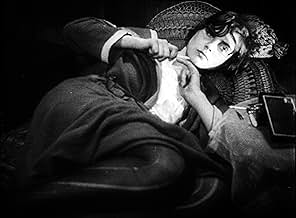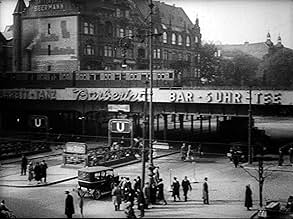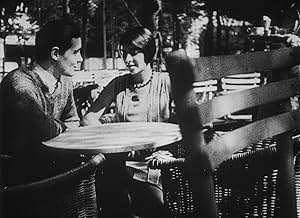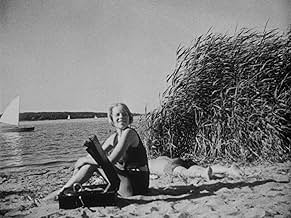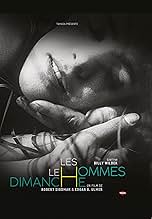IMDb-BEWERTUNG
7,3/10
3755
IHRE BEWERTUNG
Zwei Männer und zwei Frauen genießen einen schönen Sonntag am Strand inmitten der unendlichen Mühe der Arbeitswoche.Zwei Männer und zwei Frauen genießen einen schönen Sonntag am Strand inmitten der unendlichen Mühe der Arbeitswoche.Zwei Männer und zwei Frauen genießen einen schönen Sonntag am Strand inmitten der unendlichen Mühe der Arbeitswoche.
Kurt Gerron
- Self
- (Nicht genannt)
Valeska Gert
- Self
- (Nicht genannt)
Heinrich Gretler
- Self
- (Nicht genannt)
Moriz Seeler
- Photo Subject at Beach
- (Nicht genannt)
Ernö Verebes
- Self
- (Nicht genannt)
Empfohlene Bewertungen
On a Sunday, four young befriended people make an excursion to the lake Wannsee in Berlin to spend their free time in the sun with boat trips, bathing and flirting.
This low budget production demands to remain at the surface of everyday life and to show certain scenes, coincidences and trivialities of it. It is mostly interested in the details and shows the other side of the hectic, restless Berlin - the peace of a summerly Sunday. Here, the people are removed from the daily rush, and it is discernible how the makers agree with their protagonists. They celebrate the self-confidence of the young generation - which is not yet overshadowed by the big crisis at the beginning of the 1930s - and demonstrate the physical joy of life, the carefreeness and playfulness. The other side of this urban way of life is, which apparently only banks on superficialness and the momentary, promiscuity and the wounds coming from this, the harshness and the cold of changing feelings. It's cynically depicted in one long tracking shot over tree-tops (indicating symbolically sexual intercourse) that ends at a pile of thoughtlessly ditched trash.
This low budget production demands to remain at the surface of everyday life and to show certain scenes, coincidences and trivialities of it. It is mostly interested in the details and shows the other side of the hectic, restless Berlin - the peace of a summerly Sunday. Here, the people are removed from the daily rush, and it is discernible how the makers agree with their protagonists. They celebrate the self-confidence of the young generation - which is not yet overshadowed by the big crisis at the beginning of the 1930s - and demonstrate the physical joy of life, the carefreeness and playfulness. The other side of this urban way of life is, which apparently only banks on superficialness and the momentary, promiscuity and the wounds coming from this, the harshness and the cold of changing feelings. It's cynically depicted in one long tracking shot over tree-tops (indicating symbolically sexual intercourse) that ends at a pile of thoughtlessly ditched trash.
10tilmazio
Some of the people commenting on this movies mention the fact that it was made only three years before Hitler came to power. While this is true, it is a historical misunderstanding to think that in 1929, when the film was conceived and shot, Hitler was inevitably looming at the political horizon in Germany. In fact, in the Weimar republic of the late 20s there was good reason to believe, that the worst was over for Germany after the chaotic post-WWI-period. The economy had somewhat stabilized, the political circumstances were still chaotic, but I guess people had grown accustomed to the fact that the government changed every so often. Germany was not a democracy in the truest sense of the word, but there was a thriving lower-middle class, and that is what the people in the film are meant to represent. There was good reason to believe, that these people would be typical of Germany at this time. To think that the film makers were delusional about the true state of the German state is a judgement that comes out of knowing what happened later.
Thats what makes this film even more special in my thinking. It shows that there could have been potentially another Germany, and that fascism was not the inevitable consequence of the social condition in the early 30s, German national character or what so ever. In fact, I think thats why this master piece is not as well-known as it deserves to be. It does not fit the bill of 1920s Mabuse-style Germany, where Caligari was an early warning of the Nosferatu was the blue-print of a coming dictator etc, all this Kracauer stuff.
Having said that, I would like to point out two additional things about this film, that make it unique. First of all, with its on-location shot, its amateur actors and its next-to-nothing ,yet social realist story, it is a rare fore-runner of the post-war cinema of Italy etc, that has not acknowledged. (Then again, Rosselini et al never saw this film, but then again, where is the "neo" in "neo-realism" coming from.) It also seems to me that this might very likely be the first "indie" movie. "Indie" is of course a very vague term, and what is called "Independent cinema" differs greatly depending on where the critic is coming from. But I personally know of no other movie, that actually made it into the movie houses, that was produced by a handful of non-pros without the support of a studio. Of course, there are the surrealist films etc, but this was a reasonably successful film, not some art experiment. This is a very daring thesis, I know, but so far nobody was able to prove me wrong....
Thats what makes this film even more special in my thinking. It shows that there could have been potentially another Germany, and that fascism was not the inevitable consequence of the social condition in the early 30s, German national character or what so ever. In fact, I think thats why this master piece is not as well-known as it deserves to be. It does not fit the bill of 1920s Mabuse-style Germany, where Caligari was an early warning of the Nosferatu was the blue-print of a coming dictator etc, all this Kracauer stuff.
Having said that, I would like to point out two additional things about this film, that make it unique. First of all, with its on-location shot, its amateur actors and its next-to-nothing ,yet social realist story, it is a rare fore-runner of the post-war cinema of Italy etc, that has not acknowledged. (Then again, Rosselini et al never saw this film, but then again, where is the "neo" in "neo-realism" coming from.) It also seems to me that this might very likely be the first "indie" movie. "Indie" is of course a very vague term, and what is called "Independent cinema" differs greatly depending on where the critic is coming from. But I personally know of no other movie, that actually made it into the movie houses, that was produced by a handful of non-pros without the support of a studio. Of course, there are the surrealist films etc, but this was a reasonably successful film, not some art experiment. This is a very daring thesis, I know, but so far nobody was able to prove me wrong....
A German silent curio heralds several future magnates of the film industry in Hollywood, PEOPLE ON Sunday is the debut feature for both its directors Robert Siodmak and Edgar G. Ulmer, with a script from a tender-age Billy Wilder and Fred Zinnemann in the camera branch. It is a bracing urban symphony of Berlin during the interwar times, confining its time-frame within a weekend, convenes a cast of five non-professional young actors (who are essentially playing themselves) and blithely breaking the boundary of studio lot and taking the story onto the streets of the metropolis, from a rush-hour Behnhof Zoo train station near the beginning to the movie's main course, a Sunday outing in Wannasee.
The quintet are Erwin, a taxi driver, his model wife Annie, and his friend Wolfgang, a wine dealer, then Christl, a film extra Wolfgang accosts in the said train station and Brigitte, her friend, who works in a record shop. Throughout its simple plot structure, the narrative heartily proceeds with a bifurcating stratagem, a plump, honest-looking Erwin's squabble-plagued marital life with a languorous Annie in their pokey bedsit, contrasting with a louche Wolfgang's pat oscillation in wooing either Christl or Brigitte, furthermore, a tangible rift is wondrously evinced between the two flappers, Christl is the prim and proper type, who naturally spurns Wolfgang's advances in the well-orchestrated lake-swimming sequences, but when she notices that Wolfgang takes his offensive towards a more skittish Brigitte and the two become lovey-dovey, she can barely contain her pique, not only to Wolfgang, but also to her girlfriend.
Yet, what leaves the most piquant tang is a thoroughgoing embodiment of machismo by the two male creatures, Erwin is the off-limits married man, both girls give him a decent berth, humbled by a comparatively more good-looking and athletic Wolfgang, he knows his role very well, a sausage juggler for laughter, a cavalier company, completely forgets about Annie's absence when there are new girls around, but also seemingly attests that, when sex is off the table, girls are just girls, no further communication is worth his effort. Wolfgang is more or less more readable, cops a feel whenever he can find a chance but will not get his feet wet into a stable relationship, and if a girl becomes too pushy, there is always a Sunday football match he can attend with his buddy Erwin.
A lilting juvenilia robustly interpolates expressionistic portraiture and vignettes (there are some very impressive close-ups both in still and in motion should be attributed to the young but ingenious film crew) in all the larking and perambulating, PEOPLE ON Sunday can still turn heads not just as a chirpy comedy, but also, a counter-time escapist prose because unfortunately we cannot blot out the fact that something egregiously sinister was incubating in that touchy era and that particular country.
The quintet are Erwin, a taxi driver, his model wife Annie, and his friend Wolfgang, a wine dealer, then Christl, a film extra Wolfgang accosts in the said train station and Brigitte, her friend, who works in a record shop. Throughout its simple plot structure, the narrative heartily proceeds with a bifurcating stratagem, a plump, honest-looking Erwin's squabble-plagued marital life with a languorous Annie in their pokey bedsit, contrasting with a louche Wolfgang's pat oscillation in wooing either Christl or Brigitte, furthermore, a tangible rift is wondrously evinced between the two flappers, Christl is the prim and proper type, who naturally spurns Wolfgang's advances in the well-orchestrated lake-swimming sequences, but when she notices that Wolfgang takes his offensive towards a more skittish Brigitte and the two become lovey-dovey, she can barely contain her pique, not only to Wolfgang, but also to her girlfriend.
Yet, what leaves the most piquant tang is a thoroughgoing embodiment of machismo by the two male creatures, Erwin is the off-limits married man, both girls give him a decent berth, humbled by a comparatively more good-looking and athletic Wolfgang, he knows his role very well, a sausage juggler for laughter, a cavalier company, completely forgets about Annie's absence when there are new girls around, but also seemingly attests that, when sex is off the table, girls are just girls, no further communication is worth his effort. Wolfgang is more or less more readable, cops a feel whenever he can find a chance but will not get his feet wet into a stable relationship, and if a girl becomes too pushy, there is always a Sunday football match he can attend with his buddy Erwin.
A lilting juvenilia robustly interpolates expressionistic portraiture and vignettes (there are some very impressive close-ups both in still and in motion should be attributed to the young but ingenious film crew) in all the larking and perambulating, PEOPLE ON Sunday can still turn heads not just as a chirpy comedy, but also, a counter-time escapist prose because unfortunately we cannot blot out the fact that something egregiously sinister was incubating in that touchy era and that particular country.
In France ,Marcel Carné released his first film ,a short ,at about the same time:it was called "Nogent ou l'Eldorado du Dimanche" and it depicted the Parisians' life ,leaving the city for the banks of the Marne river ,spending a wonderful sunny day,then waiting for the next Sunday...
Carné's work was only a short (15 min) whereas Siodmak/Ulmer's film is about one hour and a quarter long.But the subject is the same.The main difference lies in the fact that,being much longer,the script writers could introduce characters .As an user has already pointed out,its games of love and jealousy in the sun ,the picnic and the pedal boat predate Jean Renoir's "Une Partie de Campagne" by six years.But Maupassant's short story was then and "Menschen am Sonntag" is now.Its documentary side is absorbing and should appeal to historians.
With "Menschen" ,a great director,too often forgotten or overlooked,Siodmak was born.Almost everything the man directed -not only the mind-boggling film noirs of the forties but the French ones ("Mister Flow" "Mollenard" "Pièges" ) and the German ones (this one,"Stürme der Leidenschaft" "Brennendes Geheimnis") as well- demands to be watched.
Carné's work was only a short (15 min) whereas Siodmak/Ulmer's film is about one hour and a quarter long.But the subject is the same.The main difference lies in the fact that,being much longer,the script writers could introduce characters .As an user has already pointed out,its games of love and jealousy in the sun ,the picnic and the pedal boat predate Jean Renoir's "Une Partie de Campagne" by six years.But Maupassant's short story was then and "Menschen am Sonntag" is now.Its documentary side is absorbing and should appeal to historians.
With "Menschen" ,a great director,too often forgotten or overlooked,Siodmak was born.Almost everything the man directed -not only the mind-boggling film noirs of the forties but the French ones ("Mister Flow" "Mollenard" "Pièges" ) and the German ones (this one,"Stürme der Leidenschaft" "Brennendes Geheimnis") as well- demands to be watched.
If you enjoy classic silent cinema then you won't want to miss this treat. At times scenes are reminiscent of King Vidor's The Crowd, made just the year before (most especially in those moments set indoors, during which one of the couples gently bicker or the scene during which the principals first meet up for their group date); while at others the open air, carefree mood is suggestive of Renoir's masterpiece Partie de Campagne, made a decade later. But People on Sunday is a distinct work in its own right, an evocative film made by some stellar talent: the Siodmak brothers, Edgar Ulmer, Billy Wilder and Fred Zimmerman - all of whom would go on to varying degrees of success in the States after fleeing the Nazis. Their film is thus both a record of a time lost, a beautifully shot piece showing a Berlin that was soon to vanish for ever, as well as demonstrating the collaborative talents of some major figures in their early years. There is no hint of the dark years to come seen here, or the debilitating effects of run away inflation which marked the end of the Weimar Republic and led to the inexorable rise of extreme politics. People on Sunday is above such explicit social comment, unless it is political by the mere fact of focusing on ordinary people. It simply tells the tale of a group (played by non professional actors we are informed, but it hard to tell such is the quality of the performances) enjoying themselves while out on one sunny weekend day, picnicking, boating, kissing, promising more to each other and so on, interspersed with more general shots of the German people similarly at play. The skill and pleasure for the viewer today is in the way this is done, completely without ostentation, shot marvelously, everything still feeling fresh, spontaneous and genuine , and with a real feeling for place. Ironically, for this viewer at least, so much of the film seems so natural and fluid that one is more aware that is an illusion; such unforced art as this takes a great deal of time, patience and skill on the part of the participants and creators.
If you want to see more of German cinema from this period, other than more familiar classics, then this is a real treat, being both less known and marvelously restored. The BFI DVD version has been created from several sources and is the longest version available. It also features a splendid Weill-like score, which fits the milieu like a glove and which begs issuing separately as it stands up well as a listen on its own.
If you want to see more of German cinema from this period, other than more familiar classics, then this is a real treat, being both less known and marvelously restored. The BFI DVD version has been created from several sources and is the longest version available. It also features a splendid Weill-like score, which fits the milieu like a glove and which begs issuing separately as it stands up well as a listen on its own.
Wusstest du schon
- WissenswertesThe film was a major hit when it was released in Germany in 1930. Five of the people who worked on the film went on to direct films in Hollywood: Curt Siodmak, his brother Robert Siodmak, Edgar G. Ulmer, Fred Zinnemann and Billy Wilder.
- PatzerWhen the movie star picture cards are torn off the wall, the number of cards still on the wall constantly changes. Sometimes more cards are still on the wall than in the shot before etc.
- VerbindungenFeatured in Geschichte(n) des Kinos: Toutes les histoires (1988)
Top-Auswahl
Melde dich zum Bewerten an und greife auf die Watchlist für personalisierte Empfehlungen zu.
- How long is People on Sunday?Powered by Alexa
Details
- Laufzeit1 Stunde 13 Minuten
- Farbe
- Sound-Mix
- Seitenverhältnis
- 1.20 : 1
Zu dieser Seite beitragen
Bearbeitung vorschlagen oder fehlenden Inhalt hinzufügen

Oberste Lücke
By what name was Menschen am Sonntag (1930) officially released in India in English?
Antwort

